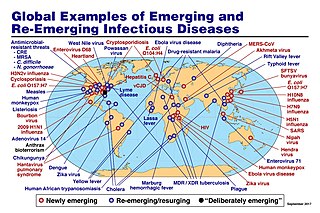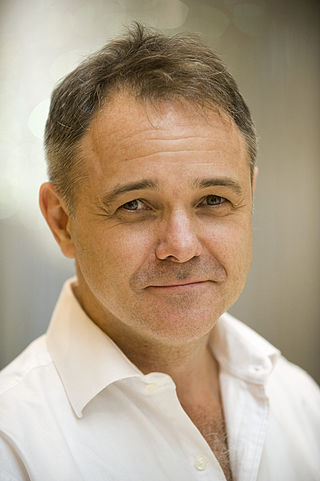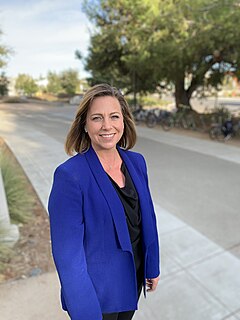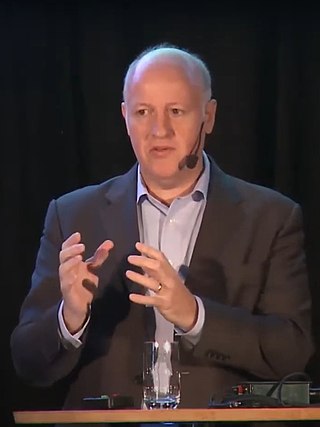Stephen S. Morse (born November 22, 1951) is an American epidemiologist, influenza researcher and specialist on emerging infectious diseases, who has served as an adviser on the epidemiology of infectious diseases and on improving disease early warning systems to numerous government and international organizations. As of 2016, he is Professor of Epidemiology at the Mailman School of Public Health of Columbia University. His seminal book Emerging Viruses (1993) was selected by American Scientist for its list of "100 Top Science Books of the 20th Century".
Morse was born in New York City on November 22, 1951. He attended the Bronx High School of Science, and received a BS degree from City College of New York (1971) and MS (1974) and PhD (1977) degrees from the University of Wisconsin–Madison.
Morse was formerly an assistant professor of virology at The Rockefeller University in New York and remains an adjunct faculty member there. He was chair and principal organizer of the 1989 NIAID/NIH Conference on Emerging Viruses, for which he originated the concept of “emerging viruses”/ “emerging infections.” He served as a member of the Institute of Medicine, National Academy of Sciences' Committee on Emerging Microbial Threats to Health (and chaired its Task Force on Viruses) and was a contributor to its report, Emerging Infections: Microbial Threats to Health in the United States, edited by Joshua Lederberg, Robert Shope and Stanley Oaks (1992).
Morse served on the steering committee of the Institute of Medicine's Forum on Microbial Threats, and the National Academy of Sciences' Committee on Biodefense. He was the founding chair of a nonprofit organization called ProMED (Program to Monitor Emerging Diseases) and was one of the originators of ProMED-mail, an international network inaugurated by it in 1994 for disease outbreak reporting and monitoring using the Internet. He was program manager for biodefense at the Defense Advanced Research Projects Agency (DARPA) of the Department of Defense (1996–2000), where he co-directed the pathogen countermeasures program and subsequently directed the advanced diagnostics program.
Morse returned to Columbia University in 2000, where he is professor of epidemiology, curriculum coordinator for the Center for Public Health Preparedness and co-director of the USAID PREDICT Project as well as director of the MPH Infectious Disease Epidemiology Certificate. He is also affiliated with the Center for Infectious Disease Epidemiologic Research and the National Center for Disaster Preparedness. Morse works with the New York City Department of Health and Mental Hygiene (DOHMH) on enhancing emergency preparedness and on training the public health workforce.
Books
Reviews and research papers

Bioterrorism is terrorism involving the intentional release or dissemination of biological agents. These agents are bacteria, viruses, insects, fungi, and/or toxins, and may be in a naturally occurring or a human-modified form, in much the same way as in biological warfare. Further, modern agribusiness is vulnerable to anti-agricultural attacks by terrorists, and such attacks can seriously damage economy as well as consumer confidence. The latter destructive activity is called agrobioterrorism and is a subtype of agro-terrorism.

Donald Ainslie Henderson was an American medical doctor, educator, and epidemiologist who directed a 10-year international effort (1967–1977) that eradicated smallpox throughout the world and launched international childhood vaccination programs. From 1977 to 1990, he was Dean of the Johns Hopkins School of Public Health. Later, he played a leading role in instigating national programs for public health preparedness and response following biological attacks and national disasters. At the time of his death, he was Professor and Dean Emeritus of the Johns Hopkins Bloomberg School of Public Health, and Professor of Medicine and Public Health at the University of Pittsburgh, as well as Distinguished Scholar at the UPMC Center for Health Security.

An influenza pandemic is an epidemic of an influenza virus that spreads across a large region and infects a large proportion of the population. There have been six major influenza epidemics in the last 140 years, with the 1918 flu pandemic being the most severe; this is estimated to have been responsible for the deaths of 50–100 million people. The most recent, the 2009 swine flu pandemic, resulted in under 300,000 deaths and is considered relatively mild. These pandemics occur irregularly.
EcoHealth Alliance is a US-based non-governmental organization with a stated mission of protecting people, animals, and the environment from emerging infectious diseases. The nonprofit is focused on research that aims to prevent pandemics and promote conservation in hotspot regions worldwide.

Michael Thomas Osterholm is an American epidemiologist, Regents Professor, and Director of the Center for Infectious Disease Research and Policy at the University of Minnesota.

The European Centre for Disease Prevention and Control (ECDC) is an agency of the European Union (EU) whose mission is to strengthen Europe's defences against infectious diseases. It covers a wide spectrum of activities, such as: surveillance, epidemic intelligence, response, scientific advice, microbiology, preparedness, public health training, international relations, health communication, and the scientific journal Eurosurveillance.

The Influenza Genome Sequencing Project (IGSP), initiated in early 2004, seeks to investigate influenza evolution by providing a public data set of complete influenza genome sequences from collections of isolates representing diverse species distributions.

An emerging infectious disease (EID) is an infectious disease whose incidence has increased recently, and could increase in the near future. The minority that are capable of developing efficient transmission between humans can become major public and global concerns as potential causes of epidemics or pandemics. Their many impacts can be economic and societal, as well as clinical. EIDs have been increasing steadily since at least 1940. For every decade since 1940, there has been a consistent increase in the number of EID events from wildlife-related zoonosis. Human activity is the primary driver of this increase, with loss of biodiversity a leading mechanism.
The ICEID or International Conference on Emerging Infectious Diseases is a conference for public health professionals on the subject of emerging infectious diseases.

Walter Ian Lipkin is the John Snow Professor of Epidemiology at the Mailman School of Public Health at Columbia University and a professor of Neurology and Pathology at the College of Physicians and Surgeons at Columbia University. He is also director of the Center for Infection and Immunity, an academic laboratory for microbe hunting in acute and chronic diseases. Lipkin is internationally recognized for his work with West Nile virus, SARS and COVID-19.
The Center for Infectious Disease Research and Policy (CIDRAP) is a center within the University of Minnesota that focuses on addressing public health preparedness and emerging infectious disease response. It was founded in 2001 by Dr. Michael Osterholm, in order to "prevent illness and death from infectious diseases through epidemiological research and rapid translation of scientific information into real-world practical applications and solutions".

Sir Jeremy James Farrar is a British medical researcher and director of the Wellcome Trust since 2013. He was previously a professor of tropical medicine at the University of Oxford.
Jianhong Wu is a Canadian applied mathematician and the founding Director of the Laboratory for Industrial and Applied Mathematics at York University. He holds the life-time title of University Distinguished Research Professor, and has been a senior Canada Research Chair in Industrial and Applied Mathematics at York University since 2001. In 2017, he was awarded the NSERC/Sanofi Industrial Research Chair in Vaccine Mathematics, Modelling and Manufacturing.

Jonna Ann Keener Mazet is an American epidemiologist and Executive Director of the University of California, Davis One Health Institute. Recognized for her innovative and holistic approach to emerging environmental and global health threats, she is an elected member of the National Academy of Medicine and a fellow of the American Association for the Advancement of Science. Mazet is a professor of Epidemiology and Disease Ecology at the UC Davis School of Veterinary Medicine, where she focuses on global health problem solving, especially for emerging infectious disease and conservation challenges.

Syra Madad is an American pathogen preparedness expert and infectious disease epidemiologist. Madad is the Senior Director of the System-wide Special Pathogens Program at NYC Health + Hospitals where she is part of the executive leadership team which oversees New York City's response to the Coronavirus disease 2019 pandemic in the city's 11 public hospitals. She was featured in the Netflix documentary series Pandemic: How to Prevent an Outbreak and the Discovery Channel documentary The Vaccine: Conquering COVID.
Pandemic prevention is the organization and management of preventive measures against pandemics. Those include measures to reduce causes of new infectious diseases and measures to prevent outbreaks and epidemics from becoming pandemics.

Caitlin M. Rivers is an American epidemiologist who as Senior Scholar at the Johns Hopkins Center for Health Security and assistant professor at the Johns Hopkins Bloomberg School of Public Health, specializing on improving epidemic preparedness. Rivers is currently working on the American response to the COVID-19 pandemic with a focus on the incorporation of infectious disease modeling and forecasting into public health decision making.

Peter Daszak is a British zoologist, consultant and public expert on disease ecology, in particular on zoonosis. He is the president of EcoHealth Alliance, a nonprofit non-governmental organization that supports various programs on global health and pandemic prevention. He is also a member of the Center for Infection and Immunity at the Columbia University Mailman School of Public Health. He lives in Suffern, New York.
Ann Marie Kimball is an American physician. She is known for being the pioneer of electronic disease surveillance for infectious disease outbreaks and pandemics. She is currently a Professor Emerita in the Department of Epidemiology at the University of Washington, a Consulting Fellow at the Chatham House Royal Institute of Foreign Affairs, and was a Strategic Consultant in Global Health at the Rockefeller Foundation. Kimball served as a technical and strategic lead for the Bill and Melinda Gates Foundation infectious disease surveillance strategy formation.

Lone Simonsen is a Danish epidemiologist and professor of population health sciences. Since the beginning of 2020, she has been the director of PandemiX, an interdisciplinary pandemic research center at Roskilde University.